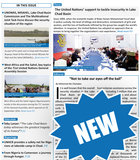
“Not to take our eyes off the ball”
It is well known that the overall security situation in the Lake Chad Basin area remains precarious and volatile. The efforts exerted by the international community to confront and curb the horrendous violence perpetrated by Boko Haram are commendable, yet the group is still able to continue its campaign of terror. While it is avoiding direct combat, it relies on ambushes, use of Improvised Explosive Devices and suicide bombers targeting vulnerable groups.
As a result, the humanitarian situation has worsened, with an ncreasing number of people suffering from food insecurity and malnutrition. According to OCHA, of the 21 million people living in affected areas in Nigeria, Chad, Cameroon and Niger, about 2.4 million have been displaced by the insurgency. Additionally, over 9 million people are in need of humanitarian assistance across the region, including 7 million that are severely food insecure, and about 480,000 children facing acute malnutrition. And malnutrition rates are expected to increase in the coming months.
I repeat these statistics to remind all of us of the appalling conditions of daily life suffered by the affected communities, not to take our eyes off the ball, to keep in mind that women, children and elders remain most vulnerable. That is what I had in mind when I visited Maiduguri, the capital of Borno State. Maiduguri is a symbol of the suffering caused by the Boko Haram-instigated violence, with the hundreds of thousands of Internally Displaced Persons (IDPs) it is hosting, yet at the same time a demonstration of the courage, resilience and hospitality of its people.
During my visits to the NSG and Bakasi Camps, which host respectively 17,000 and 10,000 IDPs, I could see, through the distress in their eyes, that these statistics are a reflection and a consequence of a human-made ordeal. I assured the people of Borno State of the commitment of the UN to support them during these challenging times, and I appealed to the surge of UN humanitarian assistance.
I wholeheartedly commend the Nigerian government, the Nigerian Army, and the military coalition of the Multi National Joint Task Force in the fight against Boko Haram. It is imperative that the international community provide concrete and effective support to the Task Force to enable them achieving even better results. It is very worrying that the 2016 Humanitarian Response Plan for the Lake Chad Basin region, necessitating US $739 million, is still only 41 per cent funded. It goes without saying that additional $163 million pledged by donors in September is welcomed. The needs are enormous, and an appropriate response should continue to help us provide much-needed support to the suffering populations.
It has now become common knowledge that addressing the roots causes of violent extremism and terrorism remains the key to curb the untold campaigns of violence we have been witnessing over the last years. This calls for a more equitable distribution of national resources, and meaningful action by policy makers to address structural issues of exclusion, social injustice, and deprivation.
In the same vein, it is worth underlining that the armies comprising the Task Force are national institutions, which are regulated by codes, principles and rules of engagement. According to these rules, the strict observance of standards of human rights and humanitarian laws must guide their action under all circumstances. State Security apparatuses and institutions should not resort to methods in combating terrorists that are likely to not only turn the population against them but also push them to the side of the insurgents.
Once again, I wish to reiterate the active solidarity of the UN and the entire international community with the governments and the peoples of the Federal Republic of Nigeria, Cameroon, Chad and Niger, in the fight against international terrorism which has manifested itself the Lake Chad Basin countries in the form of Boko Haram terrorist activities.
Mohamed Ibn Chambas
Special Representative of the Secretary-General
and Head of the UN Office for Africa West and the Sahel
 UN
UN